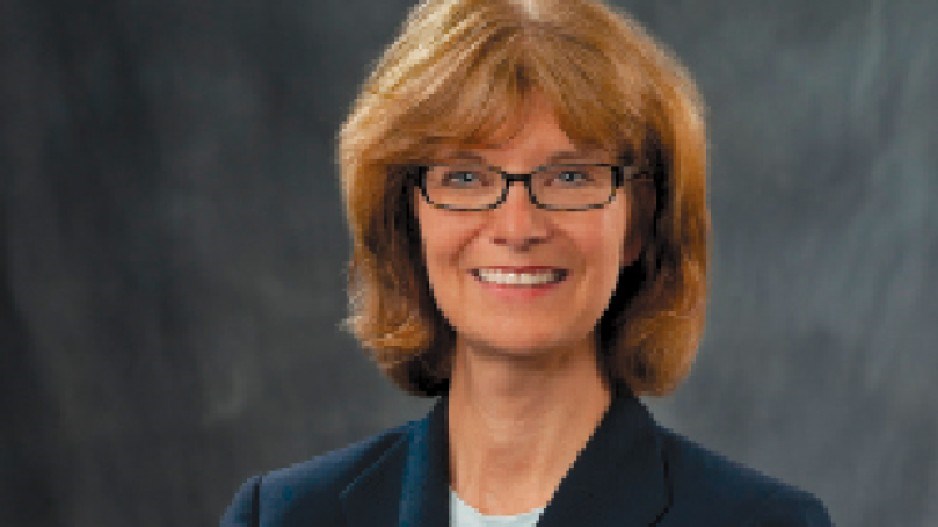If there was ever proof for today's youth that volunteer work can lead somewhere, Isobel Mackenzie is it.
"I was involved in a lot of school activities at my high school in Victoria," says Mackenzie. "I was student council president, I organized blood drives at my school, I was involved in the Kiwanis Key Club (for youth) and got invaluable experience both at the national and international level.
"I had this desire to do public service and this curiosity for how systems work and how companies work," she said.
Mackenzie went on to the University of Victoria to study political science, got her BA and then her MBA before moving through three jobs in six years at the Ministry of Finance, the local economic development commission and the United Way of Victoria.
And then she got the dream job, one that she has held for more than 17 years and has just earned her Business in Vancouver's BC CEO Award for publicly accountable organizations.
Making sacrifices
If her early years were typical for a youth leader, her experience becoming a CEO was anything but.
At age 30, just two months away from giving birth to her second child and with her MBA still unfinished, she applied for president and CEO of the then little-known Peninsula Community Services in nearby Saanich.
"I knew it was a job opportunity that wouldn't come around again soon. I had lots of doubts, but I masked them well in the interview," she said with a laugh.
She also knew there would be no pause button after she got the job.
"You can't accept a job at seven months pregnant and then take a year of maternity leave," she said. "I effectively took a couple of weeks off to work from home. Those were the sacrifices had to make to seize this opportunity."
What she lacked in experience, she made up for in sheer enthusiasm. Under her management, Peninsula – now Beacon Community Services – has grown from 160 employees and $2 million in revenues to one of the province's largest community providers with 1,300 employees, 400 volunteers and $60 million in annual revenues.
The organization serves more than 6,000 clients, providing everything from crosswalk guards and youth employment services to adult counselling, home care and assisted living.
She says it was her parents – a father who was a bush pilot turned mining executive and her mother a longtime bank employee – who were instrumental in giving her the self-confidence to take on a leadership job.
"I think the confidence comes from being raised in an environment where you were loved and supported in what you wanted to do," she said. "You could make mistakes but you could always come home. If all else fails, you've got your family to retreat to."
Calculated risks
While the average CEO can be expected to move to progressively larger organizations every three to five years, Mackenzie has stayed with Beacon, her own skills and experience growing along with that of the organization.
In smaller centres like Victoria, it's a fact of life that there are fewer job opportunities.
She was also not prepared to move from her hometown. Fortunately for Mackenzie, Beacon was in growth mode.
Her nominators attribute her success to her financial savvy and keen skill in balancing budgets over the last 17 years. Under her management, Beacon has also reduced its reliance on government revenue by developing seven thrift shops that raise an estimated $1.5 million in revenue each year, using 90% volunteer labour.
She has also taken "calculated risks" with some programs including taking responsibility for all home care in the Capital Regional District and creating an innovative new service called licensed dementia care.
It encourages adults with some cognitive impairment to assume responsibility for day-to-day tasks such as helping to prepare their own meals and do their own laundry. Studies of European models show that it keeps clients functioning at a higher level longer.
Mackenzie, who sees Beacon as "an organization rather than a business," takes the same approach with staff, encouraging them to yet higher standards of job performance.
"While we are a non-profit, I have said that we are delivering important services. Our staff needs to be recognized and compensated as the professionals they are. But just paying people a lot of money is not enough. They have to feel that the work they are doing is important and critical and that they are valued in doing that work.
"I think that ultimately people want high standards in the workplace and want to be held to those standards. And they want to be able to look to their left and to their right and see that those standards are being maintained."
Mackenzie has also set the bar high for worker safety, guiding Beacon to be the first agency to pass a Worksafe safety audit. That, and an ambitious e-learning program, are seen as reasons why nearly 90% of Beacon's staff say they are happy in their jobs and have a low turnover rate.
"They need to know that when they say to a client, 'I can't lift you" that we are going to support them. They also need to know that we are going to speak to the client and explain that what is unsafe for staff is also unsafe for the client."•
For more information on the November 20 gala awards dinner celebrating our CEOs of the Year, click here.




